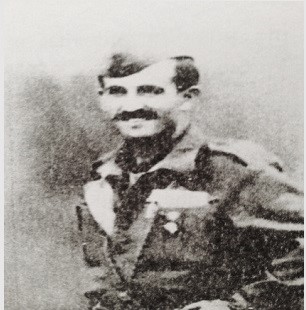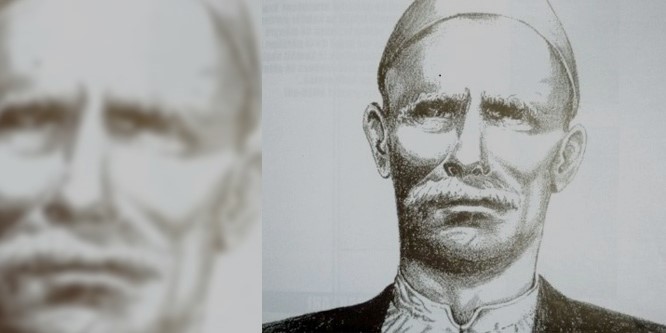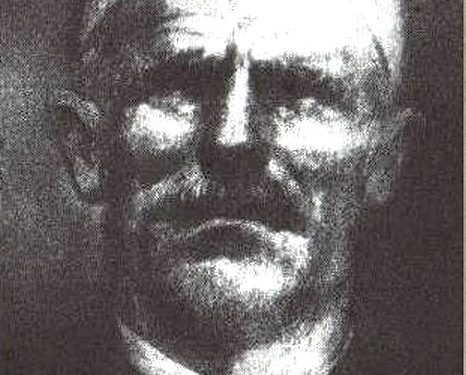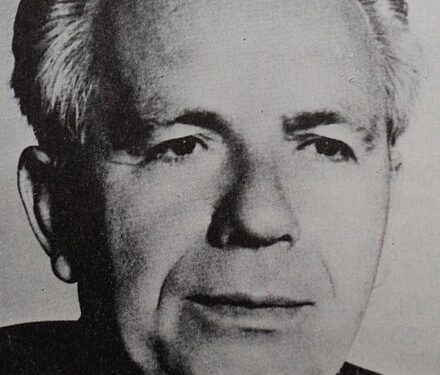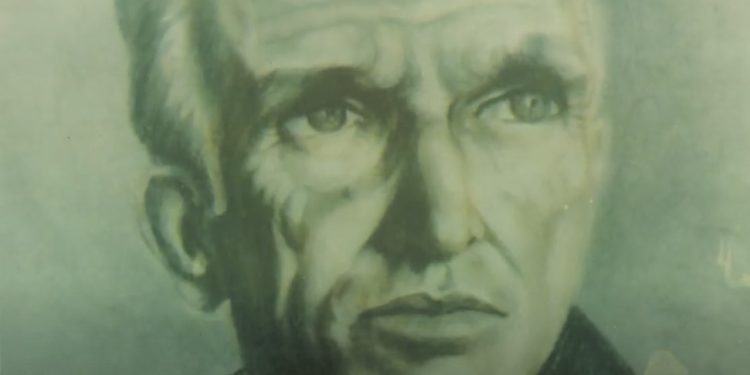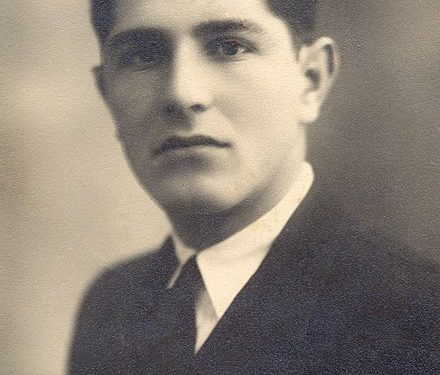By Haxhi Ademi
Memorie.al / Qamil F. Hoxha was born on October 2, 1919, in Gjakova, and he came from a poor, honest family with traditions of patriotism. He was passionate about being educated in the Albanian language, even though he was schooled in Serbian, in a four-grade school (Kosovo at that time was under the rule of the Kingdom of Yugoslavia, Serbo-Croatian-Slovenian). His desire and will to be educated in Albanian drove Qamil Hoxha to cross the border illegally in his youth and settle in Krumë of Has. Like many of his fellow countrymen, he settled in the “Kosova” dormitory, where he was raised and educated under the care of many Kosovo teachers, who were educators and pedagogues at that time, such as Ibrahim Koli, Beqir Kastrati, and many others.
During his stay in Albania, he often met with Asim Vokshi since he was the son of his aunt. Qamil Hoxha continued his studies at the Agricultural Technical High School in Golem, Kavajë, which he completed with great success. During his time in high school, besides studying the compulsory subjects, he also read books with political content, which were strictly banned at that time. Thus, he started to get involved in the political life of the time at a young age. Furthermore, he was one of the prominent organizers of the protests carried out by students and other schoolboys against injustices.
Inspired and imbued with patriotic and progressive ideas, the Italian fascist occupation of Albania on April 7, 1939, hit Qamil hard, for the entire Albanian nation. During this period, numerous protests were organized throughout Albania against Mussolini’s attack and the Italian government. Since Qamil was in Tirana, together with a group of young people, they filled bags with books from the Royal Library, which they distributed to private homes, urging people to keep them as their own eyes.
In mid-April 1939, Qamil, along with a group of Kosovars, about 150 people who had been educated in various regions of Albania, decided to leave Albania. Thus, Qamil was assigned to live for a period in Smederevo. During his stay in Smederevo, Qamil Hoxha maintained continuous contact with his family, as evidenced by a letter dated October 27, 1939, when he wrote to his sister, Makbule: “You must hold your head high; I do not dedicate my life to anyone but the homeland…”
When the Germans invaded Yugoslavia on April 6, 1941, Qamil was in Smederevo with Ibrahim, but they were forced to leave this place and then headed to Kosovo. Upon arriving in Kosovo, Qamil settled with his family in the city of Gjakova.
Transfer to Drenica
At the end of April 1941, Qamil Hoxha was appointed as an agricultural technician and director of the state nursery in Skivjan. However, in August 1941, he was transferred to Skenderaj. Here, he was appointed director and agricultural technician of the State Nursery and agricultural advisor in the villages. We can say that Qamil was one of the first antifascist organizers in this territory. Here, he began his political activity, where it is worth mentioning the establishment of initial contacts with Nexhip Shala, the head of the Directorate of Finance, marking a new stage in his political activity.
Why was Qamil F. Hoxha killed?
Why was Qamil Hoxha chosen to be the first victim on the altar of freedom, among all the leaders of the National Liberation War, after the departure of the Italian occupiers? This was due to the fact that his patriotic activity and persistence conflicted with the interests of his opponents. Thus, on January 6, 1945, in Skenderaj, a large gathering of the Drenica population, as well as military personnel of the units stationed in Skenderaj, was held.
This gathering was also attended by various state and party personalities. It is worth highlighting the participation of the Drenica Brigade, with its leader, Shaban Polluzha.
The meeting was opened by the former delegate at the Bujan Conference (from Drenica), Halil Haxhiu.
The first to speak at this gathering was undoubtedly Ali Shukriu, delegated by the Operational Staff of Kosovo and Metohija, who tried to convince Shaban Polluzha to send his brigade to Podujevë, Kurshumli, and the Srem Front as soon as possible. In this speech, Shukriu went even further, threatening the population of Drenica that all those who had committed crimes would suffer punishment, some with imprisonment and some with death.
At this meeting, Qamil Hoxha also took the floor, which later cost him dearly. In his speech, he said: “Brothers and sisters, friends and comrades, the people of Kosovo, and in particular those of Drenica, have long understood the goals of the National-Antifascist Liberation Movement and in every way have supported our activities of the Movement,” and then he added; “We are in the land of Drenica, where bread is called bread and water is called water. We will not allow the Albanians of Drenica to be used as cannon fodder for foreign interests.”
Furthermore, he stated that; “Drenica has no sons and daughters to send outside of Kosovo.” After Qamil Hoxha’s speech, Ali Shukriu ordered his arrest and brought him to the OZN Directorate, where Ali had his headquarters. For Shaban Polluzha, Qamil’s speech was appropriate and quite just, but for their enemies, it was unacceptable. Thus, Qamil was forced to present himself at the OZN, where Ali kept him until midnight, subjecting him to psychological and physical abuse that broke him down.
Moreover, they took him near the Klina River, where on January 6, 1954, in the presence of Ali Shukriu, Kërsta Filipoviqi – Grof, the leader of the OZN, without trial or indication, executed him. On that same afternoon, when Qamil Hoxha was incarcerated, the Operational Staff of Kosovo ordered Shaban Polluzha, along with the Staff and the Drenica Brigade, to head to Mitrovica as soon as possible, since on January 7, they were to participate in a meeting dedicated to reorganization of this brigade within the framework of the VII Kosovo Brigade.
At that meeting, it was planned that Miladin Popoviç, Fadil Hoxha, and others would also be present. Shaban Polluzha arrived at 10:00 in Mitrovica, but this meeting did not take place, with the justification that “those who were supposed to come were missing.”
According to a letter signed by Fadil Hoxha, sent on January 12, 1945, to the Drenica Brigade headquarters based in the village of Makerrmal, Shaban Polluzha was informed that on January 14, at 12:00, they should come to Skenderaj with a unit of his brigade to discuss with Fadil Hoxha, Kërsta Filipoviq, Xhafer Vokshi, Sadik Tafashiku, and several others about the status and future of the Drenica Brigade.
During this meeting, Fadil Hoxha asked Shaban Polluzha to depart for Podujevë as soon as possible, and no later than January 21, 1945, to be there, as the commander of the VII Kosovo Brigade, Shaban Haxhia (Demalia), and the political commissioner, Qamil Brovina, were waiting there. From there, they would continue their journey to Krushumli, and then directly to the Srem front.
At this meeting, Shaban Polluzha raised the question: “Why were the commander of the Regional Command in Skenderaj, Halil Haxhia (a participant in the Bujan Conference), Halil Bajraktari, Mullah Brahimi, Rexhep Vojvoda, Bajram Dërguti, Sadik Zeneli, as well as the patriot and intellectual Qamil Hoxha, and many others from the elite of Drenica, killed?”
In response to these questions, Fadil Hoxha replied with these words: “Uncle Shaban, as for the arrests and killings you mentioned, I am not informed, but I give you my word that we will conduct all necessary investigations, and if the perpetrator is found, he will be held accountable and will pay for this.” However, according to Qamil Hoxha’s brother, Shaniu, not a single case was uncovered and that no one received the punishment they deserved for this murder.
Kërsta Filipoviç – Grof also didn’t say anything encouraging, except to express betrayal towards the Serbian military units, etc. On the other hand, Fadil Hoxha, in response to Xhafer Vokshi, regarding “how the murder of Qamil Hoxha, the first leader of the National Anti-Fascist Liberation War in Drenica was carried out,” among other things said: “This evil was done by Ali Shkriu; he committed this murder.”
On January 21, 1945, the Drenica Brigade reached Podujevë. The fighters of this brigade were not allowed to be distributed into the units of the VII Kosovo Brigade but would remain a separate and complete brigade. To send the soldiers of the Drenica Brigade to Krushumli, several meetings were held between the representatives of the Operational Staff and the Drenica Brigade Staff, with the intention that the latter would head to the front as soon as possible.
Shaban Polluzha refused to go to the front because the agreement of January 14 had been violated. For this action, representatives of the Operational Staff ordered the disarmament of the Drenica Brigade, but this was not achieved.
On January 24, 1945, it was reported that around 12:00, the military forces of Shaban Polluzha broke the siege and then crossed the Prishtinë – Mitrovicë road, returning the forces of the XXVI Brigade, they passed into the territory of the Bjeshkët e Çiçavicës in Drenica and concentrated in Drenica.
Thus, Shaban Polluzha refused to go to the Srem front but returned to Drenica to defend his people and homeland. He remained loyal and did not abandon his comrades in ideals and the freedom fighter, Qamil Hoxha, who was executed in secret.
Qamil F. Hoxha has not been forgotten by history
During the year 1974, when a kind of political liberalization began in Kosovo, people started to write and speak a bit about Qamil Hoxha, discussions that have continued to this day. It is worth mentioning historians such as Dr. Hakif Bajrami, Sabile Keçmezi-Basha, Shani Hoxha, etc., who through their work shed light on the activity of this giant.
Furthermore, in a symbol of respect and honor for his patriotic struggle and activity in Drenica, a commemorative plaque has been erected in the center of Skenderaj, specifically near the statue of Adem Jashari, while streets in Prishtina and in his hometown, Gjakova, have been named after “Qamil Hoxha.”/Memorie.al




